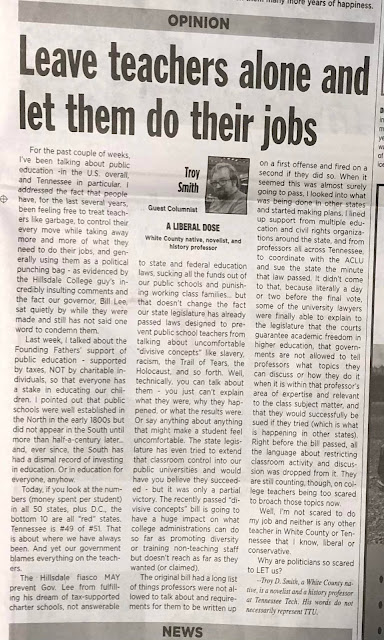A Liberal
Dose
August 25,
2022
Troy D.
Smith
“The role
of faith in the early republic”
“The United States is not, in any sense, founded on
the Christian religion.”
That’s what I closed with last week. It is a quote
from the 1797 Treaty with Tripoli (today the capitol of Libya). That’s where
the line in the Marine Hymn comes from, “to the shores of Tripoli.” That treaty
was initiated by George Washington, signed by his successor as president John
Adams, and passed unanimously by the U.S. Senate. I also referenced the “wall
of separation between church and state,” a quote from Thomas Jefferson. After
some discussion of the Founding Fathers and Christianity, I said this time I
would explain what all this means.
It’s not that hard. When George Washington or Thomas
Jefferson spoke about their own personal beliefs or opinions about God, the
Bible, or Christianity, they were NOT stating that the Christian religion was
or should be enshrined in law, or even in tradition, as the basis of the new
government they were establishing -a government founded on principles of
freedom, including freedom of religion. You can not have a government framed in
freedom of religion if that government officially promotes, enshrines, or
prioritizes one religion over others. And that’s exactly how I, and many, many
others, still look at it: as an individual, I am a Christian, but that does not
mean I want my government to force everyone else to be Christian, or to punish
them if they are not.
Jefferson considered “The Virginia Bill for
Establishing Religious Freedom”, which he wrote when he was governor of
Virginia in 1779, to be one of his proudest achievements. In that bill he wrote
that “our civil rights have no dependence on our religious opinions any more
than our opinions in physics or geometry,” and that any attempt to prevent a
citizen from holding office or voting “unless he profess or renounce this or
that religious opinion, is depriving him injuriously” of his “natural rights.”
In 1782 he said “it does me no injury for my neighbor to say there are twenty
gods or no God.” In the same 1802 letter where he praised the Constitution for
its “wall of separation between church and state,” he said that “religion is a
matter which lies solely between man and his God, that he owes account to none
other for his faith or his worship, that the legislative powers of government
reach actions only, and not opinions.”
Let’s look at that treaty more closely. Tripoli was on
“the Barbary Coast” of North Africa, and base for many independent pirates who
were long tolerated, and even supported, by the Muslim government of that
city-state. In fact, many of the pirates were actually privateers, financed by
Tripoli. The treaty was an agreement between the U.S. and Tripoli that American
shipping would be protected in the Mediterranean (which did not last long, but
that is another story). The crux of the U.S. language was that this was NOT a
case of a “Christian country” and a “Muslim country” who were naturally at odds
because of religion, which is what the government of Tripoli was used to
dealing with in relations with western powers. Here is the whole text, from
article 11:
“As the Government of
the United States of America is not, in any sense, founded on the Christian
religion; as it has in itself no character of enmity against the laws,
religion, or tranquility, of Mussulmen (Muslims); and as the said States never
entered into any war or act of hostility against any Mahometan (Mohammedan) nation, it is declared by the parties that no
pretext arising from religious opinions shall ever produce an interruption of
the harmony existing between the two countries.”
In other words: we are a secular nation, and don’t
care what your religion is. It’s not an issue.
Next time we’ll talk about what all this means today,
and in reference to Christian Nationalism.
--Troy D.
Smith, a White County native, is a novelist and a history professor at
Tennessee Tech. His words do not necessarily represent TTU.
You can find all previous entries in this weekly column HERE
A list of other historical essays that have appeared on this blog can be found HERE
Author's website: www.troyduanesmith.com




